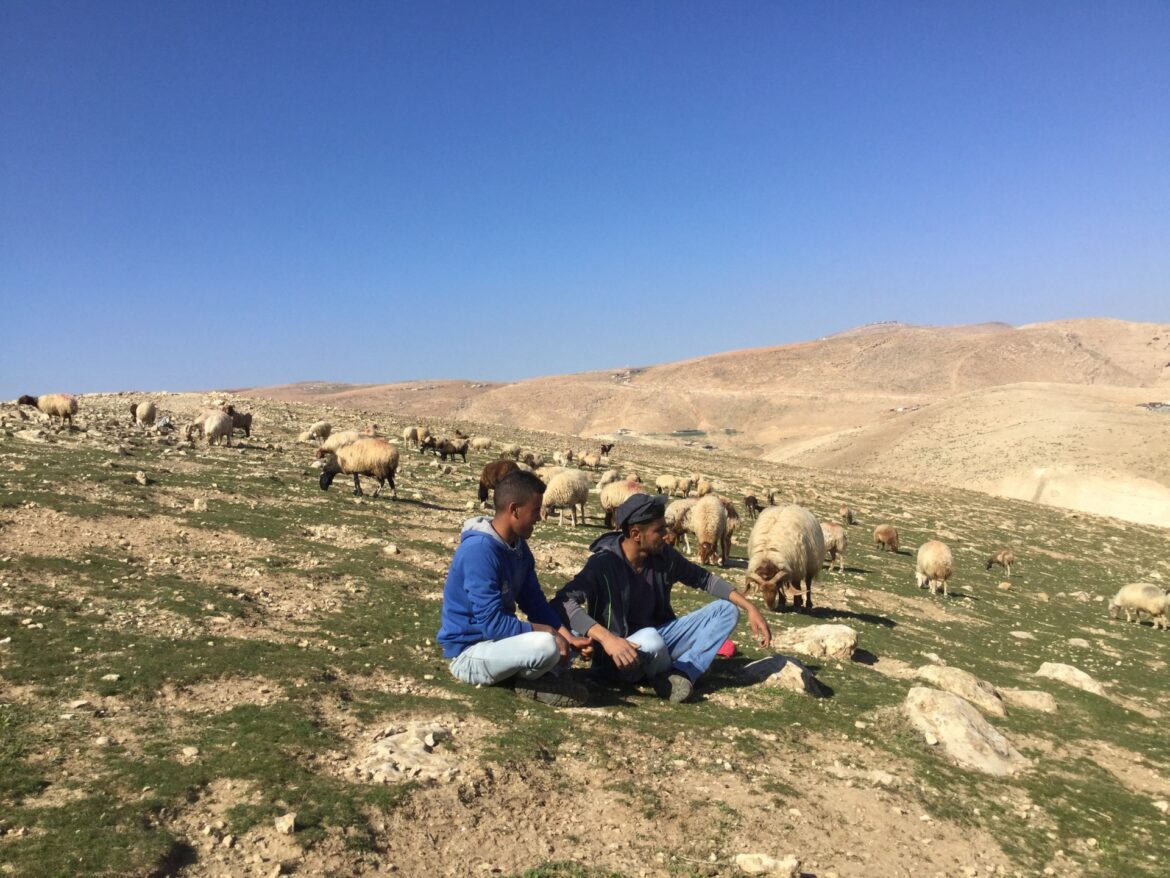The Palestinian Bedouins of the West Bank do not have time to wait for Israeli Jews to turn against their government’s policies towards them.
Instead, they rely on their own resilience – or, in Arabic, “sumud”. The term expresses the Palestinian feeling of being rooted in their own land and in their historical rights.
It is a word that has become a guiding principle for Palestinians, pushing many Bedouins to stay on their land despite constant harassment.
Many attempt to return to their villages even after their belongings have been stolen and their homes reduced to ruins, as Abu Bashar and some men from Wadi as-Seeq have done on several occasions. They tried repeatedly to recover the remains of their homes, empty enclosures and stolen solar panels, but without success.
Ekhlas Kaabneh, 25, is from the Bedouin community of Taybeh East in al-Mu’arrajat. Ekhlas’s family exemplifies Palestinian resilience: although a settlement outpost is only meters away, the family is determined to stay and continue their Bedouin life, alone, despite the displacement of the rest of their community.
Ekhlas waters the plants in front of his house, made of tin sheets, and smiles at his flowers. “These flowers bloomed despite the extreme heat this year,” she said. They always remind me of firmness; this is how we should be.
The Ekhlas community was partially displaced two years ago and completely displaced after October 7. The family lives alone on the slope of a mountainous area bordered to the north and west by olive trees. To the east are vast agricultural lands stretching to Jericho, which were inhabited and farmed by Bedouin families until 2017, when they were evicted by settlers, their agricultural land seized and colonies built in their place.
“The settlers stole our identity. (They live) like Bedouins, working in sheep and cattle breeding, even though they colonize the land without a single animal with them… They have stolen our livestock, which are among the best in the world, we we inherited from our ancestors,” Ekhlas said, the smile disappearing from his face.
Several Bedouin and Israeli activists said settlers in the new outposts since 2015 deliberately dress in Bedouin-like clothing, build tents and round up livestock. Often, passers-by can only recognize them if they initiate a conversation, because they do not speak Arabic.
Ekhlas and his family continue to face attacks. Last year, on March 29, during the Islamic holy month of Ramadan, she was beaten in her sleep, waking up with pepper spray in her eyes. She only heard the cries of her two sisters and her little brother as their house was damaged by the settlers.
“After that horrible night, we were scared… I sleep every day with a stick next to me in case of another attack. I still have nightmares about that night that make me wake up with fear,” said Ekhlas.
Besides the settlers, Ekhlas faces the threat from Israel itself. His family received a demolition order, under the pretext that their house was built on land in Area C without permission – which is notoriously difficult for Palestinians to obtain.
Area C represents almost 60 percent of the West Bank and is the main target of the illegal settlement enterprise. Area B is under joint Palestinian-Israeli control while Area A is under the governance of the Palestinian Authority (PA). In Area C, where Israel has maintained full control, including over security and zoning, since its occupation in 1967, there are at least 325,500 settlers spread across 125 settlements and more than 100 outposts. According to the United Nations, between 180,000 and 300,000 Palestinians live in Area C, including 27,500 Bedouins.
The late Palestinian President Yasser Arafat issued a decree in 2002 creating the Colonization and Wall Resistance Commission (CWRC) to combat illegal settlements.
“Its main task is to support the Palestinians in Area C by rebuilding their homes and even stationing employees among them for a period of time to help them resist and document the violations committed by the settlers,” said Younis Arar, head of the commission’s international relations unit and director in Bethlehem.
Arar himself was arrested several times by Israeli authorities while defending Palestinian homes and was injured in the foot after a settler attacked him with a car.
“Since October 7, 26 Palestinian communities and villages in the eastern West Bank and Jerusalem, as well as south of Hebron, have been completely displaced and seized, but we are doing everything possible to stabilize the remaining residents in their place,” Arar said.
“We cannot do more, the world is unable to send a sip of water to Gaza due to genocide, and we in the West Bank are also alone in resisting the occupation. We have no choice but our sumud.
It’s a choice that Ekhlas knows all too well.
“If we take a step back, they will move forward with their settlement,” she said. “We have no other land.”
This story was produced with the Internews Earth journalism network.



